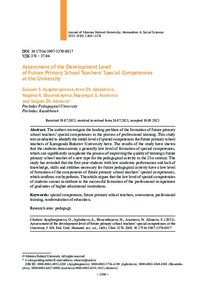Assessment of the Development Level of Future Primary School Teachers’ Special Competences at the University
Скачать файл:
URI (для ссылок/цитирований):
https://elib.sfu-kras.ru/handle/2311/144194Автор:
Ayapbergenova, Gulsum S.
Aplashova, Arna Zh.
Bissembayeva, Nagima A.
Assenova, Nazymgul S.
Alimova, Solpan Zh.
Аяпбергенова, Г. С.
Аплашова, А. Ж.
Бисембаева, Н. А.
Асенова, Н. С.
Алимова, Ш. Ж.
Дата:
2021-09Журнал:
Журнал Сибирского федерального университета. Гуманитарные науки. Journal of Siberian Federal University. Humanities & Social Sciences; 2021 14 (9)Аннотация:
The authors investigate the leading problem of the formation of future primary school teachers’ special competences in the process of professional training. This study was conducted to identify the initial level of special competences the future primary school teachers of Karaganda Buketov University have. The results of the study have shown that the students demonstrate a generally low level of formation of special competences, which can significantly complicate the process of improving the quality of training a future primary school teacher of a new type for the pedagogical activity in the 21st century. The study has revealed that the first-year students with low academic performance and lack of knowledge, skills and abilities necessary for future pedagogical activity have a low level of formation of the components of future primary school teachers’ special competences, which confirms our hypothesis. The article argues that the low level of special competencies of students cannot contribute to the successful formation of the professional competence of graduates of higher educational institutions Авторы поднимают здесь ведущую проблему формирования специальных
компетенций у будущих педагогов начальной школы в процессе профессиональной
подготовки. Исследование было проведено для выявления базового уровня
специальных компетенций студентов Карагандинского университета имени
академика Е. Букетова. Результаты продемонстрировали в целом низкий уровень
сформированности таких компетенций, что может существенно усложнить процесс
повышения качества подготовки будущего педагога начальной школы нового типа
в XXI веке. При этом первокурсники со слабой успеваемостью и отсутствием
необходимых для предполагаемой педагогической деятельности знаний, умений
и навыков имеют и низкий уровень сформированности компонентов специальных
компетенций, что подтверждает нашу гипотезу. Вместе с тем недостаточный
уровень специальных компетенций студентов не может способствовать успешному
формированию профессиональной компетентности выпускников высших учебных
заведений.

